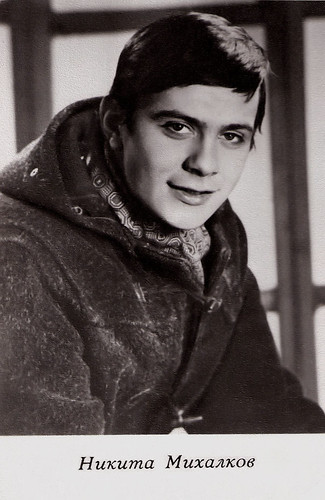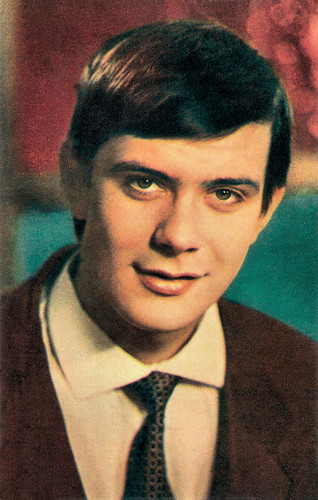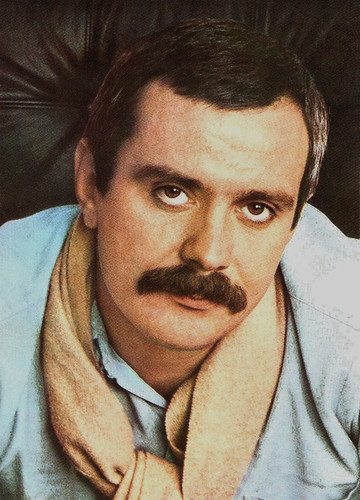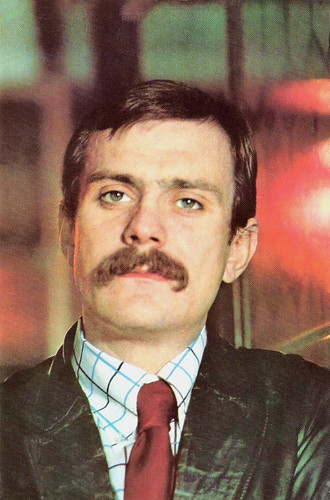Russian actor and director Nikita Mikhalkov (1945) is the younger brother of Andrey Konchalovsk(i)y and one of the most famous Soviet/Russian filmmakers. ‘The Russian Spielberg’ won an impressive amount of awards, including the Oscar for the Best Foreign Film with Utomlyonnye solntsem/Burnt by the Sun (1994). As an actor he appeared in more than 40 films.

Russian postcard by Izdanije Byuro Propogandy Sovietskogo Kinoiskusstva, no. 4896, 1967. This postcard was printed in an edition of 100.000 cards. Retail price: 8 Kop.

Russian postcard by Izdanije Byuro Propogandy Sovietskogo Kinoiskusstva, no. 1565. This postcard was printed in an edition of 210.000 cards. Retail price: 8 Kop.
Nikita Sergeyevich Mikhalkov-Konchalovsky was born in Moscow in 1945 into the distinguished, artistic Mikhalkov family. His great grandfather was the imperial governor of Yaroslavl, whose mother was a Galitzine princess. Nikita's father, Sergei Mikhalkov, was best known as a writer of children's books, although he also provided the lyrics for the Russian anthem.
Nikita's mother, the poet Natalia Konchalovskaya, was the daughter of the avant-garde artist Pyotr Konchalovsky and granddaughter of another outstanding painter, Vasily Surikov. Nikita's older brother is the filmmaker Andrey Konchalovsk(i)y, primarily known for his collaboration with Andrei Tarkovsky and his own Hollywood action films, such as Runaway Train (Andrey Konchalovsky, 1985) with Jon Voight, and Tango & Cash (Andrey Konchalovsky, 1989) starring Sylvester Stallone.
Mikhalkov studied acting at the children's studio of the Moscow Art Theatre and later at the Shchukin School of the Vakhtangov Theatre. While still a student, he appeared in the romantic comedy Ya shagayu po Moskve/I Step Through Moscow (Georgi Daneliya, 1964). It was nominated for the Golden Palm at the Cannes Film Festival.
He was soon on his way to becoming a star of the Soviet stage and cinema. He had a supporting part in Krasnaya Palatka/The Red Tent (Mikhail Kalatozov, 1969) starring Sean Connery and Claudia Cardinale. His brother directed him in Dvoryanskoe gnezdo/Home of the Gentry (Andrei Konchalovsky, 1970).
While continuing to pursue his acting career, Mikhalkov entered VGIK, the state film school in Moscow, where he studied directing under filmmaker Mikhail Romm, teacher to his brother and Andrei Tarkovsky. He directed his first short film in 1967, Devochka i veshchi/The Girl and Things (Nikita Mikhalkov, 1967), and another for his graduation, Spokoynyy den v kontse voyny/A Quiet Day at the End of the War (Nikita Mikhalkov, 1970).
His first feature was Svoy sredi chuzhikh, chuzhoy sredi svoikh/At Home Among Strangers, Stranger at Home (Nikita Mikhalkov, 1974), with Yuri Bogatyryov. It was an Ostern (East-European Western, or 'Eastern') set just after the 1920s civil war in Russia.
He established himself as one of the most promising Russian directors with a vision of his own with his second feature, Raba lyubvi/A Slave of Love (Nikita Mikhalkov, 1976), starring Yelena Solovey and Rodion Nahapetov. Set in 1917, it followed the efforts of a film crew to make a silent melodrama in a resort town while the Revolution rages around them. The film, based upon the last days of Vera Kholodnaya, was highly acclaimed upon its release in the U.S.
Mikhalkov's next film was Neokonchennaya pyesa dlya mekhanicheskogo pianino/An Unfinished Piece for Player Piano (Nikita Mikhalkov, 1977) with Aleksandr Kalyagin and Yelena Solovey. It was adapted by Mikhalkov from Anton Chekhov's early play, Platonov, and won the first prize at the San Sebastian Film Festival.
In 1978, while starring in his brother's epic film Siberiada/Siberiade (Andrey Konchalovskiy, 1978), Mikhalkov made Pyat vecherov/Five Evenings (Nikita Mikhalkov, 1979), a love story about a couple (played by Lyudmila Gurchenko and Stanislav Lyubshin) separated by World War II, who meet again after eighteen years.
Mikhalkov's next film, Neskolko dney iz zhizni I.I. Oblomova/A Few Days from the Life of I. I. Oblomov (Nikita Mikhalkov, 1980), with Oleg Tabakov in the title role, is based on Ivan Goncharov's classic novel Oblomow about a lazy young nobleman who refuses to leave his bed.
Rodnya/Family Relations (Nikita Mikhalkov, 1982) is a comedy about a provincial woman in Moscow dealing with the tangled relationships of her relatives. Bez svideteley/Without Witnesses (Nikita Mikhalkov, 1983) tracks a long night's conversation between a woman (Irina Kupchenko) and her ex-husband (Mikhail Ulyanov) when they are accidentally locked in a room.

Romanian postcard by Casa Filmului Acin, no. 53 029.

Russian postcard by Izdanije Byuro Propogandy Sovietskogo Kinoiskusstva, no. 4910, 1977. This postcard was printed in an edition of 300.000 cards. Retail price: 5 Kop.
In the early 1980s, Nikita Mikhalkov resumed his acting career, appearing in the immensely popular romance Vokzal dlya dvoikh/Station for Two (Eldar Ryazanov, 1982) and Zhestokiy romans/A Cruel Romance (Eldar Ryazanov, 1984). At that period, he also played Henry Baskerville in the Soviet screen version of The Hound of the Baskervilles, Priklyucheniya Sherloka Kholmsa i doktora Vatsona: Sobaka Baskerviley (Igor Maslennikov, 1981). He also starred in many of his own films.
Incorporating several short stories by Anton Chekhov, Oci Ciornie/Dark Eyes (Nikita Mikhalkov, 1987) stars Marcello Mastroianni as an old man who tells the story of a romance he had when he was younger, a woman he has never been able to forget. The film was highly praised, and Mastroianni received the Best Actor Prize at the 1987 Cannes Film Festival and an Academy Award nomination for his performance.
Mikhalkov's next film, Urga/Close to Eden (Nikita Mikhalkov, 1992), set in the little known world of the Mongols, received the Golden Lion at the Venice Film Festival and was nominated for the Academy Award for Best Foreign Language Film.
Mikhalkov's Anna ot 6 do 18/Anna: 6-18 (Nikita Mikhalkov, 1993) documents his daughter Anna Mikhalkova as she grows from childhood to maturity. He documents the history of Russia from 1980 to 1991 by annually asking Anna such questions as "What do you love the most?", "What scares you the most?", "What do you want above anything?" and "What do you hate the most?".
Mikhalkov's most famous production to date, Utomlyonnye solntsem/Burnt by the Sun (Nikita Mikhalkov, 1994), was steeped in the paranoid atmosphere of Joseph Stalin's Great Terror. The film received the Grand Prize at Cannes and the Academy Award for Best Foreign Language Film, among many other honours. Mikhalkov was the third Russian director to receive Oscar after Sergei Bondarchuk (in 1961) and Vladimir Menshov (in 1980). To date, Burnt by the Sun remains the highest grossing film to come out of the former Soviet Union.
Mikhalkov used the critical and financial triumph of Burnt by the Sun to raise $25,000,000 for his most epic venture to date, Sibirskiy tsiryulnik/The Barber of Siberia (Nikita Mikhalkov, 1998). The film, which was screened out of competition at the 1999 Cannes Film Festival, was designed as a grandiose, big budget romance set in the 19th century Russia. It featured Julia Ormond and Oleg Menshikov, who regularly appears in Mikhalkov's films, in the leading roles. The director himself appeared as Tsar Alexander III of Russia. The film received the Russia State Prize and became a runaway box office success.
There were rumours about Mikhalkov's presidential ambitions. The director, however, chose to administer the Russian cinema industry. Despite much opposition from rival directors, he was elected the President of the Russian Society of Cinematographers and has managed the Moscow Film Festival since 2000. He also set the Russian Academy Golden Eagle Award in opposition to the traditional Nika Award. According to Wikipedia, his style of leadership of the union has been criticised by many Russian filmmakers and critics as autocratic, and encouraged members to leave and form a rival union in April 2010.
In 2005, Mikhalkov resumed his acting career, starring in three films - Statskiy sovetnik/The Councilor of State (Filipp Yankovsky, 2005) - a Fandorin mystery film which was a Russian box-office hit, Zhmurki/Dead man’s Bluff (Aleksey Balabanov, 2005) - a noir-drenched comedy about the Russian Mafia, and Krzysztof Zanussi's Persona non grata (2005).
In 2007, Mikhalkov’s film 12 (Nikita Mikhalkov, 2007), a loose remake of Sidney Lumet's court drama 12 Angry Men (1957), received a special Golden Lion for the ‘consistent brilliance’ of its work and was praised by critics at the Venice Film Festival. 12 was also named as a nominee for the 2008 Academy Awards. He took on a role of the executive producer of an epic film 1612.
Nikita Mikhalkov's first wife was the renowned Russian actress Anastasiya Vertinskaya, whom he married in, 1967. They have a son, Stepan Mikhalkov, born in 1966. With his second wife, former model Tatyana Mikhalkova, he has a son, Artem (1975), and two daughters, Anna (1974) and Nadya (1987).
Nikita Mikhalkov is actively involved in Russian politics. He is known for his at times extreme Russian nationalist and Slavophile views, and has been a strong supporter of Russian president Vladimir Putin. In October 2007, Mikhalkov, who produced a television program for Putin's 55th birthday, co-signed an open letter asking Putin not to step down after the expiry of his term in office. Since 2015 Mikhalkov is banned from entering Ukraine because of his support for the 2014 Russian annexation of Crimea.
In 2010 he returned as a director with Utomlyonnye solntsem 2: Predstoyanie/Burnt by the Sun 2 (Nikita Mikhalkov, 2010), in which he also starred The film consists of two parts: Exodus and Citadel. It is the sequel to Burnt by the Sun (1994), set in the Eastern Front of World War II. Burnt by the Sun 2 had the largest production budget ever seen in Russian cinema ($55 mln), but it turned out to be Russia's biggest box office flop, and received negative reviews from critics both in Russia and abroad.
His most recent film is Solnechnyy udar/Sunstroke (Nikita Mikhalkov, 2014). It is set in Russia during the Red Terror in 1920 and in 1907, and is loosely based on the story Sunstroke and the book Cursed Days by Nobel Prize-winning Russian writer Ivan Bunin. The film was selected as the Russian entry for the Best Foreign Language Film at the 88th Academy Awards but it was not nominated.
Scene from Anna ot 6 do 18/Anna: 6-18 (1993). Source: HP 1067 (YouTube).
Trailer Utomlyonnye solntsem/Burnt by the Sun (1994). Source: Video Detective (YouTube).
Trailer 12 (2007). Source: Tevolution (YouTube).
Sources: Wikipedia and IMDb.

Russian postcard by Izdanije Byuro Propogandy Sovietskogo Kinoiskusstva, no. 4896, 1967. This postcard was printed in an edition of 100.000 cards. Retail price: 8 Kop.

Russian postcard by Izdanije Byuro Propogandy Sovietskogo Kinoiskusstva, no. 1565. This postcard was printed in an edition of 210.000 cards. Retail price: 8 Kop.
One of the Most Promising Russian Directors
Nikita Sergeyevich Mikhalkov-Konchalovsky was born in Moscow in 1945 into the distinguished, artistic Mikhalkov family. His great grandfather was the imperial governor of Yaroslavl, whose mother was a Galitzine princess. Nikita's father, Sergei Mikhalkov, was best known as a writer of children's books, although he also provided the lyrics for the Russian anthem.
Nikita's mother, the poet Natalia Konchalovskaya, was the daughter of the avant-garde artist Pyotr Konchalovsky and granddaughter of another outstanding painter, Vasily Surikov. Nikita's older brother is the filmmaker Andrey Konchalovsk(i)y, primarily known for his collaboration with Andrei Tarkovsky and his own Hollywood action films, such as Runaway Train (Andrey Konchalovsky, 1985) with Jon Voight, and Tango & Cash (Andrey Konchalovsky, 1989) starring Sylvester Stallone.
Mikhalkov studied acting at the children's studio of the Moscow Art Theatre and later at the Shchukin School of the Vakhtangov Theatre. While still a student, he appeared in the romantic comedy Ya shagayu po Moskve/I Step Through Moscow (Georgi Daneliya, 1964). It was nominated for the Golden Palm at the Cannes Film Festival.
He was soon on his way to becoming a star of the Soviet stage and cinema. He had a supporting part in Krasnaya Palatka/The Red Tent (Mikhail Kalatozov, 1969) starring Sean Connery and Claudia Cardinale. His brother directed him in Dvoryanskoe gnezdo/Home of the Gentry (Andrei Konchalovsky, 1970).
While continuing to pursue his acting career, Mikhalkov entered VGIK, the state film school in Moscow, where he studied directing under filmmaker Mikhail Romm, teacher to his brother and Andrei Tarkovsky. He directed his first short film in 1967, Devochka i veshchi/The Girl and Things (Nikita Mikhalkov, 1967), and another for his graduation, Spokoynyy den v kontse voyny/A Quiet Day at the End of the War (Nikita Mikhalkov, 1970).
His first feature was Svoy sredi chuzhikh, chuzhoy sredi svoikh/At Home Among Strangers, Stranger at Home (Nikita Mikhalkov, 1974), with Yuri Bogatyryov. It was an Ostern (East-European Western, or 'Eastern') set just after the 1920s civil war in Russia.
He established himself as one of the most promising Russian directors with a vision of his own with his second feature, Raba lyubvi/A Slave of Love (Nikita Mikhalkov, 1976), starring Yelena Solovey and Rodion Nahapetov. Set in 1917, it followed the efforts of a film crew to make a silent melodrama in a resort town while the Revolution rages around them. The film, based upon the last days of Vera Kholodnaya, was highly acclaimed upon its release in the U.S.
Mikhalkov's next film was Neokonchennaya pyesa dlya mekhanicheskogo pianino/An Unfinished Piece for Player Piano (Nikita Mikhalkov, 1977) with Aleksandr Kalyagin and Yelena Solovey. It was adapted by Mikhalkov from Anton Chekhov's early play, Platonov, and won the first prize at the San Sebastian Film Festival.
In 1978, while starring in his brother's epic film Siberiada/Siberiade (Andrey Konchalovskiy, 1978), Mikhalkov made Pyat vecherov/Five Evenings (Nikita Mikhalkov, 1979), a love story about a couple (played by Lyudmila Gurchenko and Stanislav Lyubshin) separated by World War II, who meet again after eighteen years.
Mikhalkov's next film, Neskolko dney iz zhizni I.I. Oblomova/A Few Days from the Life of I. I. Oblomov (Nikita Mikhalkov, 1980), with Oleg Tabakov in the title role, is based on Ivan Goncharov's classic novel Oblomow about a lazy young nobleman who refuses to leave his bed.
Rodnya/Family Relations (Nikita Mikhalkov, 1982) is a comedy about a provincial woman in Moscow dealing with the tangled relationships of her relatives. Bez svideteley/Without Witnesses (Nikita Mikhalkov, 1983) tracks a long night's conversation between a woman (Irina Kupchenko) and her ex-husband (Mikhail Ulyanov) when they are accidentally locked in a room.

Romanian postcard by Casa Filmului Acin, no. 53 029.

Russian postcard by Izdanije Byuro Propogandy Sovietskogo Kinoiskusstva, no. 4910, 1977. This postcard was printed in an edition of 300.000 cards. Retail price: 5 Kop.
Stalin's Great Terror
In the early 1980s, Nikita Mikhalkov resumed his acting career, appearing in the immensely popular romance Vokzal dlya dvoikh/Station for Two (Eldar Ryazanov, 1982) and Zhestokiy romans/A Cruel Romance (Eldar Ryazanov, 1984). At that period, he also played Henry Baskerville in the Soviet screen version of The Hound of the Baskervilles, Priklyucheniya Sherloka Kholmsa i doktora Vatsona: Sobaka Baskerviley (Igor Maslennikov, 1981). He also starred in many of his own films.
Incorporating several short stories by Anton Chekhov, Oci Ciornie/Dark Eyes (Nikita Mikhalkov, 1987) stars Marcello Mastroianni as an old man who tells the story of a romance he had when he was younger, a woman he has never been able to forget. The film was highly praised, and Mastroianni received the Best Actor Prize at the 1987 Cannes Film Festival and an Academy Award nomination for his performance.
Mikhalkov's next film, Urga/Close to Eden (Nikita Mikhalkov, 1992), set in the little known world of the Mongols, received the Golden Lion at the Venice Film Festival and was nominated for the Academy Award for Best Foreign Language Film.
Mikhalkov's Anna ot 6 do 18/Anna: 6-18 (Nikita Mikhalkov, 1993) documents his daughter Anna Mikhalkova as she grows from childhood to maturity. He documents the history of Russia from 1980 to 1991 by annually asking Anna such questions as "What do you love the most?", "What scares you the most?", "What do you want above anything?" and "What do you hate the most?".
Mikhalkov's most famous production to date, Utomlyonnye solntsem/Burnt by the Sun (Nikita Mikhalkov, 1994), was steeped in the paranoid atmosphere of Joseph Stalin's Great Terror. The film received the Grand Prize at Cannes and the Academy Award for Best Foreign Language Film, among many other honours. Mikhalkov was the third Russian director to receive Oscar after Sergei Bondarchuk (in 1961) and Vladimir Menshov (in 1980). To date, Burnt by the Sun remains the highest grossing film to come out of the former Soviet Union.
Mikhalkov used the critical and financial triumph of Burnt by the Sun to raise $25,000,000 for his most epic venture to date, Sibirskiy tsiryulnik/The Barber of Siberia (Nikita Mikhalkov, 1998). The film, which was screened out of competition at the 1999 Cannes Film Festival, was designed as a grandiose, big budget romance set in the 19th century Russia. It featured Julia Ormond and Oleg Menshikov, who regularly appears in Mikhalkov's films, in the leading roles. The director himself appeared as Tsar Alexander III of Russia. The film received the Russia State Prize and became a runaway box office success.
There were rumours about Mikhalkov's presidential ambitions. The director, however, chose to administer the Russian cinema industry. Despite much opposition from rival directors, he was elected the President of the Russian Society of Cinematographers and has managed the Moscow Film Festival since 2000. He also set the Russian Academy Golden Eagle Award in opposition to the traditional Nika Award. According to Wikipedia, his style of leadership of the union has been criticised by many Russian filmmakers and critics as autocratic, and encouraged members to leave and form a rival union in April 2010.
In 2005, Mikhalkov resumed his acting career, starring in three films - Statskiy sovetnik/The Councilor of State (Filipp Yankovsky, 2005) - a Fandorin mystery film which was a Russian box-office hit, Zhmurki/Dead man’s Bluff (Aleksey Balabanov, 2005) - a noir-drenched comedy about the Russian Mafia, and Krzysztof Zanussi's Persona non grata (2005).
In 2007, Mikhalkov’s film 12 (Nikita Mikhalkov, 2007), a loose remake of Sidney Lumet's court drama 12 Angry Men (1957), received a special Golden Lion for the ‘consistent brilliance’ of its work and was praised by critics at the Venice Film Festival. 12 was also named as a nominee for the 2008 Academy Awards. He took on a role of the executive producer of an epic film 1612.
Nikita Mikhalkov's first wife was the renowned Russian actress Anastasiya Vertinskaya, whom he married in, 1967. They have a son, Stepan Mikhalkov, born in 1966. With his second wife, former model Tatyana Mikhalkova, he has a son, Artem (1975), and two daughters, Anna (1974) and Nadya (1987).
Nikita Mikhalkov is actively involved in Russian politics. He is known for his at times extreme Russian nationalist and Slavophile views, and has been a strong supporter of Russian president Vladimir Putin. In October 2007, Mikhalkov, who produced a television program for Putin's 55th birthday, co-signed an open letter asking Putin not to step down after the expiry of his term in office. Since 2015 Mikhalkov is banned from entering Ukraine because of his support for the 2014 Russian annexation of Crimea.
In 2010 he returned as a director with Utomlyonnye solntsem 2: Predstoyanie/Burnt by the Sun 2 (Nikita Mikhalkov, 2010), in which he also starred The film consists of two parts: Exodus and Citadel. It is the sequel to Burnt by the Sun (1994), set in the Eastern Front of World War II. Burnt by the Sun 2 had the largest production budget ever seen in Russian cinema ($55 mln), but it turned out to be Russia's biggest box office flop, and received negative reviews from critics both in Russia and abroad.
His most recent film is Solnechnyy udar/Sunstroke (Nikita Mikhalkov, 2014). It is set in Russia during the Red Terror in 1920 and in 1907, and is loosely based on the story Sunstroke and the book Cursed Days by Nobel Prize-winning Russian writer Ivan Bunin. The film was selected as the Russian entry for the Best Foreign Language Film at the 88th Academy Awards but it was not nominated.
Scene from Anna ot 6 do 18/Anna: 6-18 (1993). Source: HP 1067 (YouTube).
Trailer Utomlyonnye solntsem/Burnt by the Sun (1994). Source: Video Detective (YouTube).
Trailer 12 (2007). Source: Tevolution (YouTube).
Sources: Wikipedia and IMDb.
No comments:
Post a Comment